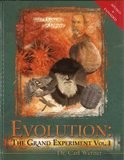Monkey Not Our Uncle
Remember “Ida,” the missing link that wasn’t? In a Nature letter, scientists attack the lofty claims that surrounded the announcement of the fossil primate.
News Source
- BBC News: “Primate Fossil ‘Not an Ancestor’”
The researchers take issue with the interpretation of Ida propounded by such prominent evolutionists as David Attenborough, who said at the time,
Now people can say, ‘Okay, you say we’re primates . . . show us the link.’ The link, they would have said until now, is missing. Well, it is no longer missing.1
We originally covered the news earlier this year, writing “Nothing about this fossil suggests it is anything other than an extinct, lemur-like creature.”2 That comment was summarily repeated by worldwide news organizations as representing the creationist view.
It wasn’t only creationists who disagreed with the “missing link” interpretation of Ida, however. In our earlier article, we quoted a slew of evolutionist scientists who felt that the Ida research was not necessarily inaccurate, but also may have been exaggerated because of financial motivations.3 The Associated Press reports, “A publicity blitz called [Ida] ‘the link’ that would reveal the earliest evolutionary roots of monkeys, apes and humans. Experts protested that Ida wasn’t even a close relative.”4
Of particular concern was that the “human ancestor” claims about Ida (which the media heavily hyped) had been cut from the peer-reviewed paper on the fossil. Further, it appeared the researchers had a vested interest in claiming Ida was significant, as they were trying to sell a book and promote a television documentary on the fossil. (Critics alleged that the team needed to earn a return on the fossil, which had been purchased at a high price).
Now, four scientists at U.S. universities have formalized some of the attacks on Ida’s missing link status.5 The team, although evolutionists, agrees with our conclusion that Ida “belonged to a group more closely linked to lemurs than to monkeys, apes, or us,” BBC News reports.6
The letter focuses on the description and analysis of a fossil called Afradapis longicristatus, which, the team argues, is closely related to Ida. Together, A. longicristatus and Ida (formally called Darwinius masillae) compose an extinct group of primates related to lemurs and lorises.
So it came as a surprise to many of us who are studying primate paleontology.
Research head Erik Seiffert, an anatomist/paleontologist at Stony Brook University, explained, “‘The suggestion that Ida [was] . . . specifically related to the higher primates, namely monkeys apes and humans, was actually a minority view from the start. So it came as a surprise to many of us who are studying primate paleontology.” Seiffert continued,
We have analyzed a large data set based on observations we have made on almost 120 living and extinct primates and . . . we find . . . Darwinius and this new genus that we’ve described are not part of our ancestry. They are more closely related to lemurs and lorises than they are to tarsirs or monkeys, apes and humans. This study would effectively remove Ida from our ancestry.7
The University of Oslo’s Jørn Hurum, who was on the original team investigating Ida, responded to the Nature paper by Seiffert et al., saying, “It’s a very interesting paper, and—at last—this is the start of the scientific discussion around the specimen we described in May nicknamed Ida.”8
As far as we’re concerned, the new study only reaffirms our original appraisal of Ida: a (presumably extinct) lemur-like creature quite distinct from humans, neither suggesting evolution nor disproving creation in any way.
Further Reading
- Did Humans Really Evolve from Apelike Creatures?
- The Origin of Humans
- Get Answers: Ape-Man, Missing Links, Fossils
For More Information: Get Answers
Remember, if you see a news story that might merit some attention, let us know about it! (Note: if the story originates from the Associated Press, FOX News, MSNBC, the New York Times, or another major national media outlet, we will most likely have already heard about it.) And thanks to all of our readers who have submitted great news tips to us. If you didn’t catch all the latest News to Know, why not take a look to see what you’ve missed?
(Please note that links will take you directly to the source. Answers in Genesis is not responsible for content on the websites to which we refer. For more information, please see our Privacy Policy.)
Footnotes
- AtheistBlog.org, “Ida, the Missing Evolutionary Link Found,” YouTube, https://www.youtube.com/watch?v=8bKHAaNxOv0, 2:37.
- “Ida (Darwinius masillae): the Real Story of this ‘Scientific Breakthrough’,” Answers in Genesis, May 21, 2009, https://answersingenesis.org/missing-links/ida-darwinius-masillae-real-story/
- Ibid.
- Malcolm Ritter, “Primate Fossil Called on a Distant Relative,” U.S. News, Octobe 21, 2009, http://www.usnews.com/science/articles/2009/10/21/primate-fossil-called-only-a-distant-relative.
- See Erik R. Seiffert, Jonathan M. G. Perry, Elwyn L. Simons, and Doug M. Boyer, “Convergent Evolution of Anthropoid-Like Adaptations in Eocene Adapiform Primates,” Nature 461 (October 22, 2009): 1118–1121, doi:10.1038/nature08429.
- “Primate Fossil ‘Not an Ancestor’,” BBC News, October 21, 2009, http://news.bbc.co.uk/2/hi/science/nature/8318643.stm.
- Ibid.
- Ibid.
Recommended Resources

Answers in Genesis is an apologetics ministry, dedicated to helping Christians defend their faith and proclaim the good news of Jesus Christ.
- Customer Service 800.778.3390
- Available Monday–Friday | 9 AM–5 PM ET
- © 2026 Answers in Genesis


